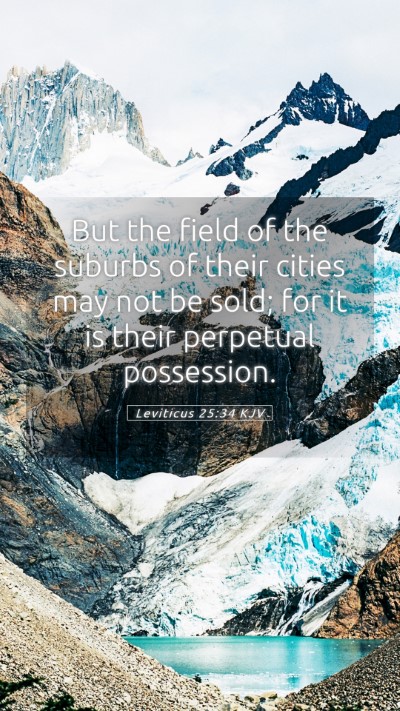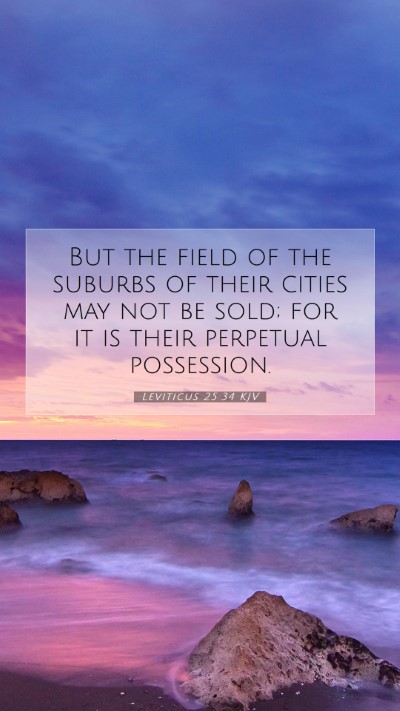Understanding Leviticus 25:34
Bible Verse: Leviticus 25:34
"But the field of the suburbs of their cities may not be sold; for it is their perpetual possession."
Introductory Overview
Leviticus 25:34 serves as a pivotal verse within the framework of the Jubilee laws in the Old Testament. This verse highlights the significance of land ownership and the concept of perpetual possession within the Israelite community. The insights from public domain commentaries such as those by Matthew Henry, Albert Barnes, and Adam Clarke provide valuable interpretations and analyses, aiding readers in grasping its deeper meanings.
Textual Analysis
The verse emphasizes that the fields located in the outskirts of cities, which were considered suburbs, are not to be sold. Instead, they are to remain with the original family or tribe, signifying God's intention for equitable land distribution among His people.
Commentary Insights
-
Matthew Henry's Commentary:
Henry notes that the prohibition against selling these fields reflects God’s care for preserving the inheritance of the tribes. This is crucial for maintaining the identity and heritage of the Israelites. He contextualizes this within the broader themes of God's justice and mercy.
-
Albert Barnes' Notes:
Barnes explains that the cities’ suburbs were established as a means for levitical cities to sustain themselves. By retaining ownership, these lands served as a buffer for the cities and protected the communal integrity specifically for the Levites, emphasizing the sacredness of their calling and responsibilities.
-
Adam Clarke's Commentary:
Clarke points out that this can also be seen as a preventive measure against economic disparity within the community. By keeping these lands within the original families, God designed a safeguard against the perils of poverty, monopoly, and injustice, which often leads to social instability.
Theological Implications
Divine Ownership: The verse underlines the principle that God is the ultimate owner of the land, and humans are merely stewards of the resources He provides. This fosters a deeper understanding of our relationship with material possessions and emphasizes the importance of stewardship.
Community Welfare: The repeated emphasis on the land not being sold can be interpreted as a divine guideline for ensuring communal welfare and support. Within the biblical context, this serves to remind believers of their responsibilities towards one another, promoting an environment of mutual assistance and care.
Practical Applications
The teachings from Leviticus 25:34 have meaningful applications in contemporary life, particularly in the context of ethics in business, social justice, and community relations.
- Social Equity: This scripture encourages modern readers to seek fairness and equity in their dealings with others, advocating for the rights of the lower socioeconomic classes.
- Responsibility in Ownership: While property ownership is common today, this verse reminds individuals of their responsibilities in using their possessions for the good of the community.
- Preservation of Heritage: It also teaches the importance of preserving one’s heritage and the legacies that are passed through generations, prompting reflection on how believers can maintain their cultural and spiritual identities.
Cross References
- Numbers 36:7-9: Addresses the retention of tribal inheritance and reinforces the importance of familial land ownership.
- Deuteronomy 15:1-2: Discusses the cancellation of debts every seven years, promoting a socio-economic reset that aligns with God’s principles of justice.
- Jeremiah 32:7-15: Offers a narrative on land redemption, illustrating the significance of land within God’s covenant with His people.
Conclusion
The exploration of Leviticus 25:34 provides invaluable Bible verse meanings and invites deeper Bible verse interpretations that consider the historical, theological, and practical aspects of the text. This analysis enhances our Bible verse understanding, enabling a richer engagement with the scriptures. Whether you are part of a Bible study group or seeking online Bible study, the insights derived from key commentaries can transform your Bible study insights and help articulate the significance of Bible verses in both historical and modern contexts.


